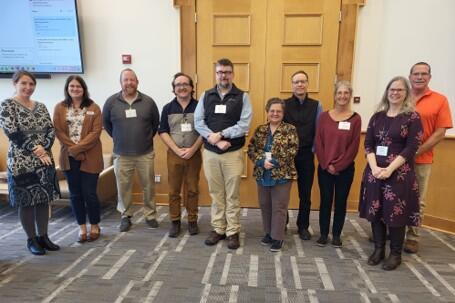Symposium explores food systems for humans and wildlife

Food systems for humans and wildlife was the theme of a symposium held Oct. 17-18 at the University of Illinois Urbana-Champaign. The annual symposium focuses on a particular aspect of international food security each year.
“We have to integrate agriculture with wildlife, or wildlife populations are going to continue to suffer,” said Mike Ward, co-organizer of the Eighth Annual Food Security Symposium at Illinois and professor in the Department of Natural Resources and Environmental Sciences (NRES) in the College of Agricultural, Consumer and Environmental Sciences (ACES).
Bringing together experts in sustainable agrifoods, soils, wildlife, and pesticides, the presenters offered different perspectives that allowed for well-informed discussion and for everyone to learn from each other.
Michelle Wander, emeritus professor and director of the Agroecology and Sustainable Agriculture Program, NRES, served as the symposium’s co-organizer along with the ACES Office of International Programs.
“This event brought together people who are taking a landscape approach to improving agriculture to bolster diversity, equity, and climate resilience. For example, the State Department’s Vision for Adapted Crops and Soils is similar to, and synergistic with the approach that CIMMYT is taking. We invited speakers from both agencies to show domestic and international applications. Mike Ward’s work added an important dimension on biodiversity here and abroad. And our local partners, the Prairie Research Institute and Prairie Rivers Network, added additional local perspectives. We are also fortunate to have Crop Sciences Professor Aaron Hager, an expert on the EPA’s pesticide management plans, on campus to round out the program,” said Wander.
Symposium recordings are available here.
To conclude each day’s program, the participants, including faculty, students, and community members, joined in a round table format to discuss the topics in more detail and brainstorm opportunities and next steps.
“The symposium allowed people to collaborate who aren’t usually talking to each other. We are still thinking about additional ways to move the conversation forward,” said Ward.
International Scene topics:
Food security and opportunity crops - New sciences needed to succeed - Sieglinde Snapp, Sustainable Agrifood Systems Program Director, CIMMYT
The Vision for Adapted Crops and Soils (VACS) – A roadmap for sustaining humans and wildlife - Jeff Herrick, Research Scientist at USDA-ARS and Senior Advisor to the US Special Envoy for Global Food Security
Mexico case study - Wildlife considerations within local production systems - Mike Ward, Professor and Stuart L. and Nancy J. Levenick Chair in Sustainability, Department of Natural Resources and Environmental Sciences, University of Illinois Urbana-Champaign
Domestic Scene topics:
Domestic examples of things that work! Targeting areas and programs to protect critical habitat for wildlife - Mike Ward, Professor and Stuart L. and Nancy J. Levenick Chair in Sustainability, Department of Natural Resources and Environmental Sciences, University of Illinois Urbana-Champaign
Review of EPA’s pesticide management plans and compliance with the Endangered Species Act - Aaron Hager, Professor and Extension Specialist, Weed Science and IPM, University of Illinois Urbana-Champaign
Pesticides and plant damage in Illinois natural areas - TJ Benson, Principal Research Scientist and Critical Trends Assessment Program Coordinator, Illinois Natural History Survey, Prairie Research Institute
Policy and wildlife declines in Illinois – Jonathan Hettinger, Director of Ecological Health, Prairie Rivers Network
The presentations were recorded and are archived on the ACES International Media Space channel.
Follow up activities will include a white paper and related efforts that lead to policy and action to benefit wildlife and working lands.